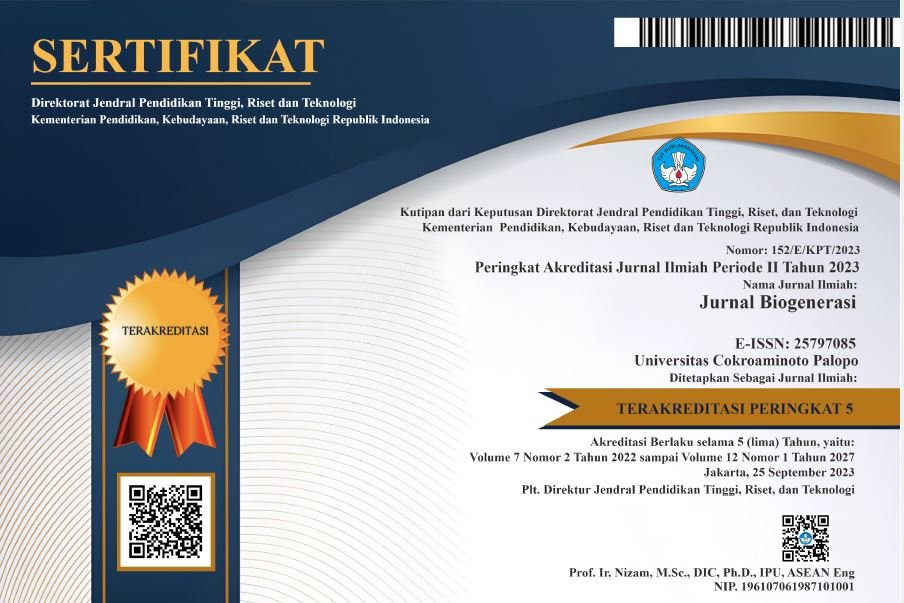ANALISIS FAKTOR KESULITAN BELAJAR SISWA PADA PELAJARAN BIOLOGI SECARA DARING DI SMAN 13 TAKALAR
DOI:
https://doi.org/10.30605/biogenerasi.v7i2.2062Keywords:
learning difficulties, online learning, biologyAbstract
Learning difficulties are the inability of students to master a subject matter maximally within the allotted time due to several factors that influence it. The application of online learning in biology lessons makes students experience problems in learning. This study aims to determine what factors influence student learning difficulties during online learning in biology lessons at SMAN 13 Takalar. The research method uses a quantitative descriptive approach. The data collection technique was in the form of a student response questionnaire regarding learning difficulties in biology lessons online at SMAN 13 Takalar. The results of the descriptive analysis of the study indicate that the factors that influence students' learning difficulties in online biology lessons at SMAN 13 Takalar are health factors which are classified as moderate category, students' boredom factor is classified as moderate category, family factors are classified as low category, school factors are classified as low category, mass media factors are classified as low category and environmental factors are classified as medium category.
Downloads
References
Amini, F., Nasution, M. Y., Mulkan, M., & Sugito, H. (2018). Analisis kemampuan kognitif dan kesulitan belajar siswa materi sistem ekskresi di SMA Negeri 1 Karang Baru. Jurnal Pelita Pendidikan, 6(4).
Atsani, K. L. G. M. Z. (2020). Transformasi media pembelajaran pada masa Pandemi COVID-19. Al-Hikmah: Jurnal Studi Islam, 1(1), 82-93.
Fadhilatunisa, D., Fakhri, M. M., & Rosidah, R. (2020). Pengaruh Blended Learning Terhadap Aktivitas Belajar Dan Hasil Belajar Mahasiswa Akuntansi. Jurnal Pendidikan Akuntansi Indonesia, 18(2), 93-106.
Ferazona, S. (2022). A Analisis Kesulitan Belajar Siswa dalam Mempelajari Materi Biologi pada Proses Pembelajaran Online. Al Jahiz: Journal of Biology Education Research, 3(1), 63-72.
Hayat, S. (2021). Kesulitan belajar daring siswa kelas X Mipa pada mata pelajaran Sejarah Kebudayaan Islam di MAN Kota Surabaya (Doctoral dissertation, UIN Sunan Ampel Surabaya).
Iklina, T., & Fadilah, M. (2022). Validitas E-Modul Berbasis Project Based Learning (PJBL) tentang Materi Sistem Imun Kelas XI SMA untuk Meningkatkan Kreativitas Peserta Didik. Journal on Teacher Education, 4(1), 250-626.
Irianto, Sielsy. (2022). Analisis Kesulitan Dan Hasil Belajar Biologi Siswa Pada Pembelajaran Daring Di SMAN 11 Luwu. Skripsi.
Jeranah, J., Nur, S., & Nurmiati, N. (2015). Faktor-faktor yang mempengaruhi kesulitan dan minat belajar mahasiswa jurusan pendidikan biologi universitas sulawesi barat. SAINTIFIK, 1(2), 87-94.
Parikesit, H., Adha, M. M., Hartino, A. T., & Ulpa, E. P. (2021). Implementasi teknologi dalam pembelajaran daring di tengah masa pandemik COVID-19. Jurnal Pendidikan Kewarganegaraan Undiksha, 9(2), 545-554.
Pawicara, R., & Conilie, M. (2020). Analisis pembelajaran daring terhadap kejenuhan belajar mahasiswa Tadris Biologi IAIN Jember di tengah pandemi Covid-19. ALVEOLI: Jurnal Pendidikan Biologi, 1(1), 29-38.
Rahmania, S., Wijayanti, R., & Hakim, S. L. (2020). Strategi Orang Tua Dalam Pendampingan Belajar Anak Selama Pandemi Covid-19. Literasi: Jurnal Kajian Keislaman Multi-Perspektif, 1(1), 99-110.
Robandi, D., & Mudjiran, M. (2020). Dampak pembelajaran dari masa pandemi covid-19 terhadap motivasi belajar siswa SMP di Kota Bukittinggi. Jurnal Pendidikan Tambusai, 4(3), 3498-3502.
Sadikin, A., & Hamidah, A. (2020). Pembelajaran Daring di Tengah Wabah Covid-19. Biosilico, 6, 214-224.
Utami, Y. P., & Cahyono, D. A. D. (2020). Study at home: Analisis kesulitan belajar matematika pada proses pembelajaran daring. Jurnal Ilmiah Matematika Realistik, 1(1), 20-26.
Winata, I. K. (2021). Konsentrasi dan Motivasi Belajar Siswa terhadap Pembelajaran Online Selama Masa Pandemi Covid-19. Jurnal Komunikasi Pendidikan, 5(1), 13.
Arif , W. P., Azizs, P.A., Syahriani, Syamsul, Anisa, Saparuddin. (2022). Analisis Sikap Belajar Mahasiswa Terhadap Pembelajaran Secara Online. Binomial. 5 (1), 25-33.
https://doi.org/10.46918/bn.v5i1.1222
Downloads
Published
How to Cite
Issue
Section
License
In submitting the manuscript to the journal, the authors certify that:
- They are authorized by their co-authors to enter into these arrangements.
- The work described has not been formally published before, except in the form of an abstract or as part of a published lecture, review, thesis, or overlay journal.
- That it is not under consideration for publication elsewhere,
- That its publication has been approved by all the author(s) and by the responsible authorities – tacitly or explicitly – of the institutes where the work has been carried out.
- They secure the right to reproduce any material that has already been published or copyrighted elsewhere.
- They agree to the following license and copyright agreement.
License and Copyright Agreement
Authors who publish with this journal agree to the following terms:
- Authors retain copyright and grant the journal right of first publication with the work simultaneously licensed under Creative Commons Attribution License (CC BY 4.0) that allows others to share the work with an acknowledgment of the work's authorship and initial publication in this journal.
- Authors are able to enter into separate, additional contractual arrangements for the non-exclusive distribution of the journal's published version of the work (e.g., post it to an institutional repository or publish it in a book), with an acknowledgment of its initial publication in this journal.
- Authors are permitted and encouraged to post their work online (e.g., in institutional repositories or on their website) prior to and during the submission process, as it can lead to productive exchanges, as well as earlier and greater citation of published work.


.png)

